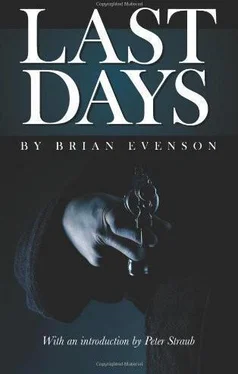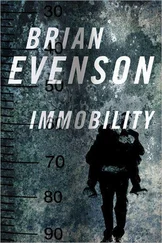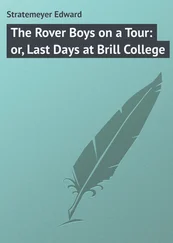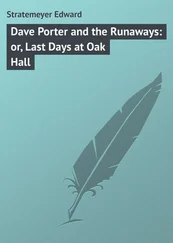He was not going out, he realized hours later. The milk still ringing the bottom of the glass had dried into a white sheet and had begun to crack. Perhaps it was days later. He had missed his chance, he realized, and now what little will he had had slipped away and it was too late. He closed his eyes. When he opened them it was dark outside, so he closed them again.
When he opened them, a pale daylight leaked into the room through the curtains. Beside him, sitting on kitchen chairs they had dragged into the bedroom, were two men. They were bundled in heavy coats and gloves and scarves despite the warmth of the room.
"Hello, hello," said the first, his voice bass.
"We knocked," said the other. His upper lip was mostly missing, a ragged scar in its place; it looked as if the lip had been cut into with a pair of pinking shears. "We knocked and knocked, but nobody answered. So we let ourselves in. It was locked," he said, "but we knew you didn't mean the lock for us."
When Kline didn't say anything, the one with the torn lip said, "You remember us? The telephone?" The man lisped on the us , but having seen the lip it was hard for him to think of him as just Lisp anymore.
"The telephone," said Kline, his voice raspy.
The torn-lipped man raised his eyebrows and looked at his companion. "He's pretending not to remember," he said.
"Of course you remember," said the one with the bass voice. "Opportunity knocking? All that?"
"Ah," said Kline. "I'm afraid so."
"Look at you," said Torn-Lip. "Do you want to die in bed?"
"You don't want to die in bed," said Low Voice.
"We're here to save you," said Torn-Lip.
"I don't want to be saved," said Kline.
"He doesn't want to be saved," said Low Voice.
"Sure he does," said Torn-Lip. "He just doesn't know it yet."
"But I-"
"Mr. Kline," said Torn-Lip, "we have given you every opportunity to be reasonable. Why didn't you take advantage of either of the tickets we left for you?"
"I don't need your ticket," said Kline.
"When was the last time you ate?" asked Low Voice.
Torn-Lip reached out and prodded Kline's face with a gloved finger. "Clearly, you are your own worst enemy, Mr. Kline."
"Depression," said Low Voice. "Lassitude, ennui. I so diagnose."
"Look," said Kline, struggling to lift himself up a little in the bed. "I'm going to have to ask you to leave."
"He sits," said Torn-Lip.
"Or nearly so. Who says the man doesn't have any fight left to him?"
"That's the spirit," said Torn-Lip. "That's the man who can have his hand cut off and not flinch."
"Come away with us, Mr. Kline."
"No," said Kline.
"What can we say to convince you?"
"Nothing," said Kline.
"Well, then," said Torn-Lip. "Perhaps there are means other than words."
Kline watched as the man grasped one of his gloved hands with the other. He twisted the hand about and levered it downward and the hand came free. Kline felt his stump tingle. The other man, he saw, was doing the same thing. They pulled back their sleeves to show him the bare exposed lumps of flesh in which their forearms terminated.
"You see," said Torn-Lip, "just like you."
"Come with us," said the other.
"But," said Kline. "I don't-"
"He thinks we're asking," said Torn-Lip, leaning in over the bed, his damaged mouth livid. "We're not asking. We're telling."
Before he knew it, their hands were screwed back on and they had him out of the bed and were dragging him down the emergency stairwell.
"Wait," he said. "My claw."
"Your claw?"
"For my hand."
You don't need it , they claimed, and kept pulling him down the stairs. "Where are you taking me?" he asked.
"He wants to know where we're taking him, Ramse," said Low Voice.
"To the car," said Torn-Lip-said Ramse-grunting the words. They came to a landing and Kline felt his own body sway to one side and then steady itself. Ramse was beside him, his head sticking out from under Kline's arm, his lips, torn and whole, tight against each other. "Tell him we're going to the car," Ramse said.
"We're going to the car," said Low Voice, and Kline looked over to find Low Voice's head under the other arm.
"But," he said.
"Enough questions," said Ramse. "Just try to move your feet. If you have them, may as well use them."
He looked down and could not see feet, only legs. There was a whispery sound, but it wasn't until they left the landing and started down the next set of stairs and the sound changed to a thumping that he realized it was his own feet dragging. He tried to get his feet underneath him, but the two men were moving too quickly and all he could do was to nearly trip them all down the stairs.
"Never mind, never mind," said Ramse. "We're almost there." And indeed, Kline realized, they were pushing through the fire exit door and into full sunlight. There was a car there, long and black with tinted windows. They hustled him into the back of it.
Ramse got in on the driver's side, Low Voice on the other. There was something wrong with the steering wheel, Kline noticed, as if a cup holder had been welded into it. Low Voice opened the glove box, awkwardly groped a candy bar out of it with his artificial hand, passed it back to Kline.
"Eat this," he said. "It'll help focus you."
Kline heard the locks snap down. He took the candy bar, began to strip the wrapper off it. It was almost more than he could manage. In the front, the two men were shucking their coats and hats, piling them on the seat between them. He watched Ramse snap off his artificial hand, glove and all, and drop it atop the pile. Low Voice did the same.
"That's better," Low Voice said.
Kline ate a little of the candy bar. It was chocolate, something crispy inside it. He chewed. Ramse, he realized, was holding his remaining hand up, toward the other man.
"Gous?" Ramse asked.
"What?" the man said. "Yes, right," Gous said. "Sorry."
With his single hand he reached out and took Ramse's remaining hand and twisted it. Kline watched the hand circle about and break free. Ramse rubbed his two stumps against each other. Gous reached out and took hold of Ramse's ear, tore it off. It came free, leaving a gaping unwhelked hole behind.
"There," said Ramse. "That's better." He looked at Kline in the rearview mirror, lifted up both stumps. "Like you," he said, smiling. "Only more so."
They drove, the city slowly dissolving around them and breaking up into fields and trees. Gous kept rummaging in the glove box, passing back food. There was another candy bar, a plastic bag of broken pretzels, a tin of sardines. Kline took a little of each, left what remained on the seat beside him. He was beginning to feel a little more alert. Outside, the sun was high; even through the tinted glass it looked hot outside. They turned right and went up a ramp and entered the freeway, the car quickly gaining speed.
"Where are we?" Kline asked.
"Here we go," said Gous, ignoring him.
"Smooth sailing from here on out," said Ramse. "For a while anyway."
"But," said Kline. "Where, I don't-"
"Mr. Kline," said Gous. "Please sit back and enjoy the ride."
"What else?" asked Kline.
"What else?" said Gous.
"What do you mean what else?" asked Ramse.
"What else comes off."
"Besides the hands and the ear?" said Ramse. "Some toes," he said, "but they're already off. Three gone from one foot, two from the other."
"What happened?" asked Kline.
"What do you mean what happened , Mr. Kline? Nothing happened ."
"We don't do accidents," said Gous. "Accidents and acts of God don't mean a thing, unless they're followed later by acts of will. Pretzel?" he asked.
"Your own case was hotly debated," said Ramse. "Some wanted to classify it as an accident."
Читать дальше












